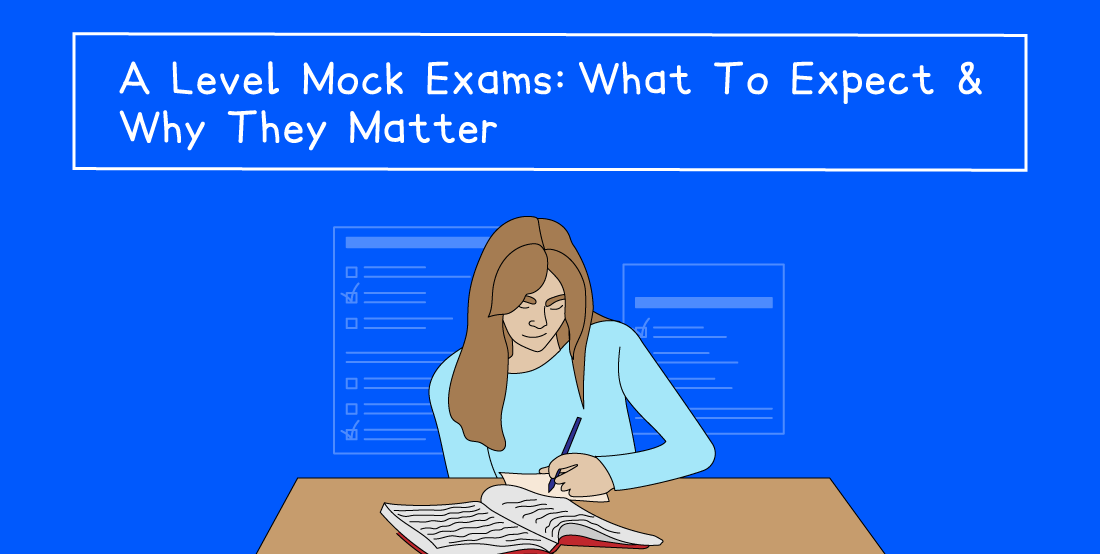A Level Mock Exams: What To Expect & Why They Matter
Written by: Holly Barrow
Reviewed by: Liam Taft
Published

Contents
What are A Level mock exams?
As you progress through your A Level studies, one of the most important milestones you'll face before your final exams is the mock exam period. These practice exams are set by your teachers to mirror the real A Level exams. They’re a great way of testing how well you’re currently doing, and highlighting areas of improvement.
A Level mocks usually take place midway through Year 13 (and sometimes Year 12).
They’re typically based on actual past paper questions and mirror the format, timing and difficulty of the official A Level exams set by the exam board.
For example, if you’re sitting Edexcel A Level Maths Paper 1 (9MA0), your mock exam will reflect its structure. This means it will be 2 hours long, worth 100 marks, and include a combination of short answer and extended response questions.
If you're getting ready for your mock exams, Save My Exams has a whole host of A Level past papers to help you revise — plus a brand new Mock Exams feature. You can now practise with full-length mock papers written by experienced teachers and examiners. Try one of our Edexcel A Level Maths mock papers at home to see how you're doing.
Why are A Level mocks so important?
1. Real exam practice under timed conditions
Mock exams are an excellent way to gain first-hand experience of sitting lengthy, high-pressure exams. At A Level, papers can last up to three hours and require sustained concentration and analytical thinking. These are vital skills that can only really be improved through practice.
Completing mocks under timed conditions can also help to alleviate exam stress for your actual A Level exams, as you’ll understand what’s required of you. You’ll also learn how to master your pacing and what standard is expected.
2. Insight into your strengths and weaknesses
Mock exams are one of the best diagnostic tools available. They show how well you can apply knowledge—not just how much you’ve memorised. You’ll find out where your understanding is solid and where you need to revisit topics.
Falling short of your target grade in a mock exam isn’t a failure—it’s a wake-up call. Use your results to build a targeted revision plan that prioritises weaker areas.
3. They inform predicted grades
How you perform in your mocks plays a critical role in forming predicted grades. These are used in UCAS applications and by universities when making conditional offers.
In rare cases where exams are cancelled, or you’re unable to sit them (e.g. illness or exceptional circumstances), mock results can contribute to teacher-assessed grades. That’s why it’s crucial to take them seriously.
If you want to gauge where you’re currently performing, why not try Save My Exams’ Mock Exams tool? You’ll be given a baseline grade estimate after completing the mock, helping you to track your progress.
How to prepare for your A Level mock exams
1. Start with the exam specification
Each exam board publishes detailed specifications outlining the topics, skills and assessment objectives for your subject. This is an excellent indicator of what you’ll be tested on and should be used to inform your revision.
This way, you’ll be sure no topic is left uncovered.
2. Build a realistic revision timetable
Learning how to manage your time is essential, especially when it comes to revision.
Before sitting your mocks, break down each subject into topics and spread your revision over several weeks. Refer to the exam spec when you do this to make sure you’ve got everything covered.
Plan around your lesson schedules, commitments and your own personal learning style. If you know you find it easier to concentrate in the evenings, take this into account when making a revision timetable.
Consistency is key. Studying little and often is more effective than cramming. Include regular breaks to prevent burnout.
3. Use different revision formats
Avoid passive revision methods like rereading notes. Instead, use strategies that engage your brain and promote long-term retention. These include:
Use flashcards for key definitions and formulas
Attempt past paper questions and mock exams and mark them against official mark schemes
Tackle exam-style questions on each topic
4. Try out different study techniques
From spaced repetition and active recall to the Pomodoro method, there are multiple proven strategies to make revision more effective. Now is the ideal time to experiment to find what works best for you.
We have a whole host of helpful revision tips and advice from our expert teachers and examiners over on our Learning Hub.
Here are some specific articles that might help you:
Do A Level mocks affect your final grades?
Not directly. Mock results don’t count toward your final A Level grade. However, they can influence predicted grades, which are key to your university offers.
They’re also a great way for you and your teachers to identify areas of weakness ahead of your actual exams.
In rare situations like illness or emergencies, mocks may serve as part of the evidence for final teacher-assessed grades—so they still carry weight.
What happens after A Level mocks?
After you’ve sat your mocks, your teachers will return your papers with detailed feedback. Don’t just glance at your marks—review your answers, identify patterns in your mistakes, and ask questions.
Use the feedback to update your revision plan. Focus on improving technique as well as content. This self-reflection is a vital step on your journey to A Level success.
Frequently Asked Questions
Are A Level mocks harder than real exams?
Your mocks are typically just as challenging as the real deal, since they’re based on past papers. However, the content covered might vary depending on how much of the course has been taught.
Your teacher may not include topics you’re yet to cover, but if they do, they’ll take this into account when analysing your results.
When are A Level mock exams held?
Most schools hold Year 13 mocks between December and February. Some may also run Year 12 mocks in the summer term.
Don’t underestimate the importance of your Year 12 mocks, as some sixth forms and colleges exclusively use exams taken at the end of Year 12 to inform your predicted grades. You should take all of your mock exams seriously.
What if I fail my mock exams?
Mock results are a tool, not a final judgement. Failing a mock gives you the chance to identify weak spots early and work on them before the real exams.
That said, mock exams at A Level tend to carry more significance than they did at GCSE. While GCSE mocks were mainly a way to gauge your progress, A Level mocks are often used by teachers to predict your final grades — and those predicted grades play a key role in university applications.
In many cases, universities make offers based on these predictions, so doing well in your mocks can really strengthen your application and open up more options.
How much should I revise for mock exams?
Quality matters more than quantity. Aiming for 2–4 hours a day is a good rule of thumb, but make sure it fits around your schedule and energy levels. Focus on active revision techniques like practice questions, flashcards, or teaching someone else. These are usually more effective than just reading through notes.
Using revision resources tailored to your specific exam board can also help you stay focused on the topics that actually matter, saving time and boosting your confidence.
What happens if I miss a mock exam?
It’s important to try your best to sit your mock exams. If it’s unavoidable that you’re going to miss a mock A Level exam, it's important to let your teacher know as soon as possible. Here’s what typically happens:
You might be able to resit it: Your sixth form or college may allow you to take the mock exam at another time, especially if you had a valid reason like illness or an emergency.
It could affect predicted grades: Mocks often contribute to your predicted grades for university applications. Missing one might mean your teacher has less evidence when deciding your grade, so they might rely more on classwork, other assessments, or their overall judgment.
You'll miss valuable practice: Mocks are a chance to get used to exam conditions and identify areas to improve. Missing one means missing that opportunity, but you can still practise using past papers or ask your teacher for feedback on other work.
Ace your A Level mocks with Save My Exams
Want to try full-length A Level mock exams at home? Practice makes perfect, and with our new Mock Exams feature, you can put your knowledge to the test like never before. Complete our mock exam papers under real exam conditions to gauge where you currently stand. This is perfect for building confidence and timing skills before the big day. You’ll also get instant feedback on your answers thanks to our Smart Mark tool for selected A Level courses.
Save My Exams is your go-to resource for A Level revision. Our expert teachers and examiners have created high-quality revision notes, exam-style questions, flashcards and more, each tailored to your specific exam board. They cover everything you need to know so you can focus only on what really matters.
Explore Our A Level Revision Resources
References
Sign up for articles sent directly to your inbox
Receive news, articles and guides directly from our team of experts.

Share this article


 written revision resources that improve your
written revision resources that improve your